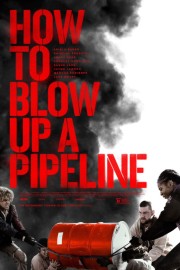How to Blow Up a Pipeline
Climate change has been a fundamental concern of society most of my life. Even when “An Inconvenient Truth” came out in 2006, it still felt like a very far off situation. Now, the race against the clock to at least mitigate the damage to where it’s not a full-on, extinction-level catastrophe is on, and unfortunately, greed and a generation of politicians closer to death than those not in power, have decided it’s not work it. “How to Blow Up a Pipeline” isn’t about the larger issues of how to keep the damage of climate change at a minimum, but what it means to be an environmental activist. At a certain point, raising awareness and peaceful protesting isn’t enough- you have to send a message.
Daniel Goldhaber’s film is based on ideas in the book by Andreas Malm, but rather than giving us a comprehensive look at the social justice movement when it comes to climate change, his screenplay with Ariela Barer and Jordan Sjol looks at a collective of activists whom are doing more than protest- the only thing that will send a message is disruption. Each person comes from a different background, and different circumstances, but all have that same goal, to protect Earth for the future. We watch as they put together the pieces of their plan, how some of the team members meet, what they mean to each other, and the machinations of the plot in motion. Nothing can be left to chance, regardless of how much time one thinks they have.
The way the film builds the team is very much in the “Ocean’s Eleven” tradition, where we see different personalities at play, different specialties for each member, and how things seemingly go wrong. Structuring this as a thriller is smart because it minimizes the potential preachiness of the central subject without losing the stakes of what they’re doing. Goldhaber does a great job of keeping the suspense moving at a brisk pace, even as the film flashes back to moments of connection between the characters. There are individuals in this ensemble that stand out more than others- Dwayne (Jake Weary), a father whose property is being invaded with the pipeline; Alisha (Jayme Lawson), who’s girlfriend, Theo (Sasha Lane), was diagnosed with leukemia after toxic pollution; and Michael (Forrest Goodluck), who has a thing for homemade bombs. All of the characters hold our interest, however, especially as the film builds to its climax, and reveals just how detailed their plan is.
Activism that involves action like blowing up a pipeline has consequences, but the film helps us see why sometimes, such actions are necessary, and how it can work without backfiring on the larger movement. If they succeed, but cause their own ecological disaster, they’re being hypocritical. If they get arrested, their lives could be over, and just be seen as martyrs for a cause that will not make a dent in the engine of capitalism that will keep moving. Change doesn’t come without action, though, and it’s easy to see how the actions of these individuals could end up not making a difference in the long run, but at least they have the courage to try. We all should be so luck to be that courageous.










